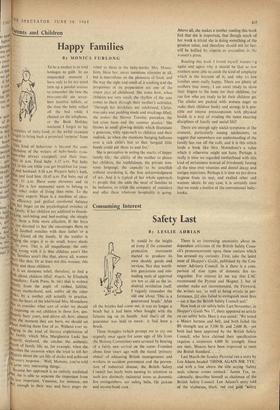Happy Families
By MONICA FURLONG To be a mother is to lend hostages to guilt. In an unguarded moment I have only to let my mind turn up a painful avenue to remember the time the two-year-old ate seven- teen laxative tablets, or the time the baby rolled off the bed while I chatted on the telephone. or the Bank Holiday
weekend I forgot to lay supplies of baby-food, or the awful occasion ILf°T•get to bring back a promised 'surprise' from This kind of behaviour is beyond the corn- k-eb ension of the excepted) o baby-books 11fow-who always . and their time- 14%b'ies (6 a.m. Feed baby. 6.45 a.m. Put baby lek in his cot while you get breakfast for your- !klf and husband. 9.30 a.m. Prepare baby's bath, Ittle and feed him. 10.45 a.m. Put baby out of ,‘4117s, 11 a.m. Have some elevenses and sit `°, for a few moments) seem to belong to bare , e other order of living than mine. To the 4b)-eure experts Mum is a machine of abso- lute
efficiency and perfect emotional balance
time h., her finger on the psychological switches of "III? family. If her children are addicted to thumb- kicking, nail-biting and bed-wetting, she simply lives them a little more affection. If the boys kre• 100 devoted to her she encourages them, to 10 football matches v■ ith their father or a 'anlY friend off the family. If the toddler is linging she urges it to do small, brave deeds 54 ‘; its IS own. This is all magnificent; the only ,71'ig wrong with it is that children aren't like '41, families aren't like that, above all, women (teift like that. Or at least not this woman, this .,Y and these children. It is an immense relief, therefore, to find a ok about children Waif Angels, by Elisabeth llillefiore: Faith Press, Rs. 6d.) that is written 'rely from the angle of rushed, fallible, xious motherhood, and, unlike all the other ks by a mother still actually in practice. 'loin the heart of the NS hirlwind Mrs. Monteliore ;ties to consider what sort of order we should et imposing on our children in those few, des- PerL ItelY busy years, and above all, how, almost 'tom the moment they 'are born, we should set 44out making them free of us. Without ever in- Ulging in the kind of literary exploitation of er family which Miss Marghanita Laski has lIroperly deplored, she catches the authentic • keen( of family life, as, for example, N+hen she :vibes the occasion when she tried to tell her 014‘ken about the sex life of ducks and achieved 111, weary response: 'Well, Mummy, you've told 4; tonic very interesting things.' because her approach is an entirely unclinical 6ric, she is able to separate the important from less important. Vitamins, for instance, are • el. enough in their way and have pages de-
voted to them in the baby-books. Mrs. Monte- liore, bless her. never mentions vitamins at all, but is marvellous on the pleasures of food, and the way the sight and smell of it cooking and the perquisites of its preparation arc one of the major joys of childhood. She notes how, when children are very small, the rhythm of the year comes to them through their mother's activities. 'Through her birthdays arc celebrated, Christ- mas cake and pudding made and stockings filled; she makes the Shrove Tuesday pancakes, the hot cross buns and the summer picnics.' She throws in small glowing details which illuminate a generous, witty approach to children and their outlook, as when she mentions hanging balloons over a sick child's bed so that 'languid little hands could pat them to and fro.'
She is perceptive in noting the marks of happy family life: the ability of the mother to please her children, the truthfulness, the private non- sense language, the capacity to be unselfish without overdoing it, the free acknowledgment of sex. And it is typical of her whole approach t9 people that she adds the need of families to be inclusive, to relish the company of outsiders and offer them whatever hospitality' is going.
Above all, she makes a mother reading this book feel that she is important, that though much of her work is trivial she is doing something of the greatest value, and therefore should not let her- self be bullied by experts or journalists in the women's press.
Reading this hook I bound myself wondering again and again why it should be that su few mothers seem able to catch the kind of simplicity which is the keynote of it, and why sa few families seem really happy. There arc plenty of mothers (too many, I am sure) ready to slave their lingers to the bone for their children; far too few who are ready to let their children go. The clinics are packed with women eager to make their children husky and strong; is it pos- sible our intense preoccupation with physical health is a way of evading the more exacting disciplines of family and social life?
There are enough ugly social symptoms at the moment, particularly among adolescents, to suggest that somewhere our understanding of the family has run off the rails, and it is this which lends a book like Mrs. Montefiore's a value which it otherwise might not have. Perhaps it really is time we regarded motherhood with this kind of seriousness instead of frivolously fussing all the time over vitamins and dental decay and antigen injections. Perhaps it is time we put down hygiene from its scat, and exalted other and warmer ideals. In any case, it is certainly time that we made a bonfire of the conventional baby- books.










































 Previous page
Previous page